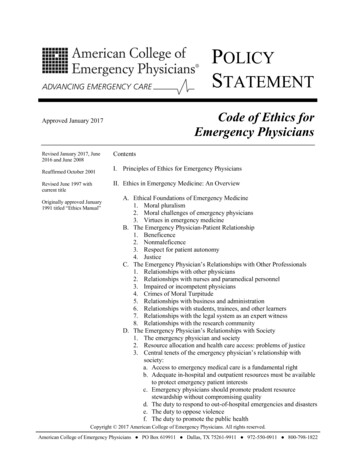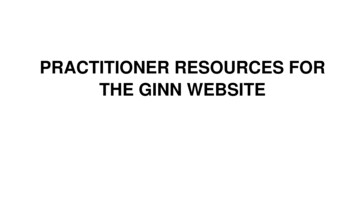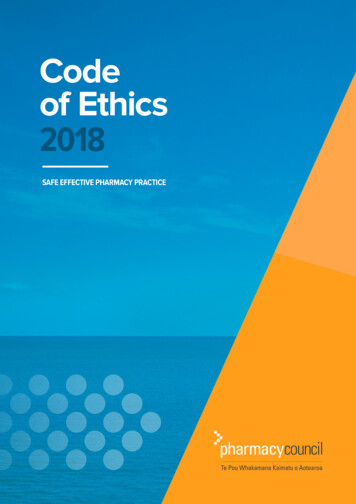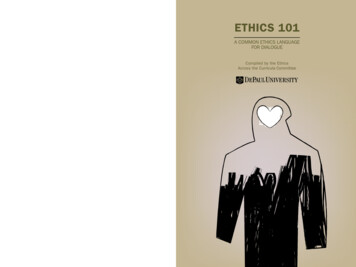
Transcription
POLICYSTATEMENTCode of Ethics forEmergency PhysiciansApproved January 2017Revised January 2017, June2016 and June 2008Reaffirmed October 2001Revised June 1997 withcurrent titleOriginally approved January1991 titled “Ethics Manual”ContentsI. Principles of Ethics for Emergency PhysiciansII. Ethics in Emergency Medicine: An OverviewA. Ethical Foundations of Emergency Medicine1. Moral pluralism2. Moral challenges of emergency physicians3. Virtues in emergency medicineB. The Emergency Physician-Patient Relationship1. Beneficence2. Nonmaleficence3. Respect for patient autonomy4. JusticeC. The Emergency Physician’s Relationships with Other Professionals1. Relationships with other physicians2. Relationships with nurses and paramedical personnel3. Impaired or incompetent physicians4. Crimes of Moral Turpitude5. Relationships with business and administration6. Relationships with students, trainees, and other learners7. Relationships with the legal system as an expert witness8. Relationships with the research communityD. The Emergency Physician’s Relationships with Society1. The emergency physician and society2. Resource allocation and health care access: problems of justice3. Central tenets of the emergency physician’s relationship withsociety:a. Access to emergency medical care is a fundamental rightb. Adequate in-hospital and outpatient resources must be availableto protect emergency patient interestsc. Emergency physicians should promote prudent resourcestewardship without compromising qualityd. The duty to respond to out-of-hospital emergencies and disasterse. The duty to oppose violencef. The duty to promote the public healthCopyright 2017 American College of Emergency Physicians. All rights reserved.American College of Emergency Physicians PO Box 619911 Dallas, TX 75261-9911 972-550-0911 800-798-1822
ACEPPOLICYSTATEMENTCode of Ethics for Emergency PhysiciansPage 2 of 14III. A Compendium of ACEP Policy Statements on Ethical IssuesRevised 2020, 2019, 2018, 2017, 2016, 2015, 2014, 2013, 2012, 2011, 2010, 2009, 2008, 2007, 2006,2005, 2004, 2003, X.Y.Z.AA.BB.CC.ACEP Business ArrangementsAdvertising and Publicity of Emergency Medical CareAnimal Use in ResearchAntitrustAudiovisual Recording in the Emergency DepartmentCivil CommitmentCollective Bargaining, Work Stoppages, and SlowdownsCollege Board Member and Officer Expert TestimonyCommercial Filming of Patients in the Emergency DepartmentConfidentiality of Patient InformationConflict of InterestConflicts of Interest in Biomedical ResearchCultural Awareness and Emergency CareDelivery of Care to Undocumented PersonsDisclosure of Medical ErrorsDomestic Family ViolenceElectronic Prescription Drug Monitoring ProgramsEmergency Physician Contractual RelationshipsEmergency Physician Rights and ResponsibilitiesEmergency Physician Stewardship of Finite ResourcesEmergency Physicians’ Patient Care Responsibilities Outside the Emergency DepartmentEMTALA and On-call Responsibility for Emergency Department PatientsEthical Issue at the End-of-LifeEthical Issues of ResuscitationEthical Use of Telemedicine in Emergency CareExpert Witness Guidelines for the Specialty of Emergency MedicineFictitious PatientsGifts to Emergency Physicians from IndustryGuidelines for Emergency Physicians on the Interpretation of Physician Orders for LifeSustaining Treatment (POLST)DD. Law Enforcement Information Gathering in the Emergency DepartmentEE. Medical NeutralityFF. Medical Practice Review and the Practice of MedicineGG. Nonbeneficial (“Futile”) Emergency Medical InterventionsHH. Non-Discrimination and HarassmentII. Observers in Emergency Medical SettingsJJ. Optimizing the Treatment of Pain in the Emergency DepartmentKK. Patient-and Family-Centered Care and the Role of the Emergency Physician Providing Care to aChild in the Emergency DepartmentLL. Patient Autonomy and Destination Factors in Emergency Medical Services (EM) and EMSAffiliated Mobile Integrated Healthcare/Community Paramedicine ProgramsMM. Physician Reporting of Potentially Impaired DriversNN. Separation of Children from Family/GuardiansOO. Treatment of Family, Friends, Colleagues, and SelfPP. Universal Health Care CoverageQQ. Use of Patient RestraintsRR. Use of Social Media by Emergency PhysiciansCopyright 2017 American College of Emergency Physicians. All rights reserved.American College of Emergency Physicians PO Box 619911 Dallas, TX 75261-9911 972-550-0911 800-798-1822
ACEPPOLICYSTATEMENTCode of Ethics for Emergency PhysiciansPage 3 of 14I. PRINCIPLES OF ETHICS FOR EMERGENCY PHYSICIANSThe basic professional obligation of beneficent service to humanity is expressed in various physicians'oaths and codes of ethics. In addition to this general obligation, emergency physicians accept specificethical obligations that arise out of the unique features of emergency medical practice. The principleslisted below express fundamental moral responsibilities of emergency physicians.1. Emergency physicians shall embrace patient welfare as their primary professional responsibility.2. Emergency physicians shall respond promptly and expertly, without prejudice or partiality, to theneed for emergency medical care.3. Emergency physicians shall respect the rights and strive to protect the best interests of theirpatients, particularly the most vulnerable and those with impaired decision-making capacity.4. Emergency physicians shall communicate truthfully with patients and secure their informedconsent for treatment, unless the urgency of the patient's condition demands an immediateresponse or another established exception to obtaining informed consent applies.5. Emergency physicians shall respect patient privacy and disclose confidential information onlywith consent of the patient or when required by an overriding duty such as the duty to protectothers or to obey the law.6. Emergency physicians shall deal fairly and honestly with colleagues and take appropriate action toprotect patients from health care providers who are impaired or incompetent, or who engage infraud or deception.7. Emergency physicians shall work cooperatively with others who care for, and about, emergencypatients.8. Emergency physicians shall engage in ongoing study to maintain the knowledge and skillsnecessary to provide high quality care for emergency patients.9. Emergency physicians shall act as responsible stewards of the health care resources entrusted tothem.10. Emergency physicians shall support societal efforts to improve public health and safety, reduce theeffects of injury and illness, and secure access to emergency and other basic health care for all.II. ETHICS IN EMERGENCY MEDICINE: AN OVERVIEWA. Ethical Foundations of Emergency MedicineAlthough professional responsibilities have been a concern of physicians since antiquity, recentyears have seen dramatic growth of both professional and societal attention to moral issues in healthcare. This increased interest in medical ethics is a result of multiple factors, including technologicaladvances, the medicalization of societal ills, the growing sophistication of patients, efforts to protectdisadvantaged groups, and the persistently rising costs of health care. All of these factors contributeto the significance, the complexity, and the urgency of moral questions in contemporary emergencymedicine.1. Moral pluralismEmergency physicians can utilize a variety of sources for ethical guidance, includingprofessional oaths and codes of ethics, cultural values, social norms embodied in the law,religious and philosophical moral traditions, clinical experience, practical reasoning skills, andprofessional role models. All of these sources claim moral authority, and together they canCopyright 2017 American College of Emergency Physicians. All rights reserved.American College of Emergency Physicians PO Box 619911 Dallas, TX 75261-9911 972-550-0911 800-798-1822
ACEPPOLICYSTATEMENTCode of Ethics for Emergency PhysiciansPage 4 of 14inspire physicians to lead rich and committed moral lives. Problems arise, however, whendifferent sources of moral guidance come into conflict. Numerous attempts have been made topropose and defend an overarching moral theory able to assess and prioritize moral claims fromall of their various sources. Lacking agreement on the primacy of any one of these theories,however, we are left with multiple sources of moral guidance. The goal of bioethics is to help usunderstand, interpret, and weigh competing moral values as we seek reasoned and defensiblesolutions to moral problems encountered in health care.2. Moral challenges of emergency physiciansThe unique setting and goals of emergency medicine give rise to a number of distinctive moralchallenges, including the following:a. Patients often arrive at the emergency department with acute illnesses or injuries thatrequire immediate care. In these emergent situations, emergency physicians have little timeto gather additional data, consult with others, or deliberate about alternative treatments.Instead, there is a presumption for quick action guided by predetermined treatmentprotocols.b. Patients in the emergency department often are unable to participate in decisions regardingtheir health care because of acute changes in their mental state. When patients lackdecision-making capacity, emergency physicians cannot secure their informed consent totreatment.c. Emergency physicians typically have had no prior relationship with their patients in theemergency department. Patients often arrive in the emergency department unscheduled, incrisis, and sometimes against their will. Thus, emergency physicians cannot rely on earnedtrust or on prior knowledge of the patient's condition, values, or wishes regarding medicaltreatment. The patient's willingness to seek emergency care and to trust the physician isbased on institutional and professional assurances rather than on an established personalrelationship.d. Emergency physicians typically practice in an institutional setting, the hospital emergencydepartment, and in close working relationships with other physicians, nurses, emergencymedical technicians, and other health care professionals. Thus, emergency physicians mustunderstand and respect institutional regulations and inter-professional norms of conduct.e. In the United States, emergency physicians have been given a unique social role andresponsibility to act as health care providers of last resort for many patients who have noother ready access to care.f. Emergency physicians have a societal duty to render emergency aid outside their normalhealth care setting when such intervention may save life or limb.g. By virtue of their broad expertise and training, emergency physicians are expected to be aresource for the community in out-of-hospital care, disaster management, toxicology,cardiopulmonary resuscitation, public health, injury control, and related areas.All of these special circumstances shape the moral dimensions of emergency medical practice.3. Virtues in emergency medicineAs noted above, the emergency department is a unique practice environment with distinctivemoral challenges. To respond appropriately to these moral challenges, emergency physiciansneed knowledge of moral concepts and principles and moral reasoning skills. Of equalimportance, however, are morally valuable attitudes, character traits, and dispositions, identifiedin ethical theory as virtues. The virtuous person is motivated to act in accordance with his or hermoral beliefs and ideals, and he or she serves as a role model for others. It is therefore importantCopyright 2017 American College of Emergency Physicians. All rights reserved.American College of Emergency Physicians PO Box 619911 Dallas, TX 75261-9911 972-550-0911 800-798-1822
ACEPPOLICYSTATEMENTCode of Ethics for Emergency PhysiciansPage 5 of 14to identify and promote the moral virtues needed by emergency physicians. Fostering thesevirtues can be a kind of moral vaccination against the ethical pitfalls inherent in emergencymedical practice. Two timeless virtues of Western though have essential roles in emergencymedicine today: courage and justice.Courage is the ability to carry out one’s obligations despite personal risk or danger. Thecourageous physician advocates for patients against financial gatekeepers, demandingemployers, interrogating police, inexperienced trainees, dismissive consultants, unconcernedfamilies, and inquiring reporters, among others. Emergency physicians exhibit courage whenthey assume personal risk to provide steadfast care for all emergency patients, including thosewho are agitated, violent, infectious, and the like.Justice or fairness is the disposition to give each person what is due to him or her. Justice helpsemergency physicians shepherd resources, make appropriate triage decisions, and employtherapeutic parsimony, refusing marginally beneficial care to some while guaranteeing a basiclevel of care for all others.Additional virtues important to the practice of emergency medicine are vigilance, impartiality,trustworthiness, and resilience.Vigilance is perhaps the virtue most emblematic of emergency medicine. In no other specialty dophysicians provide immediate assistance, at all times, for patients across the entire spectrum ofmedical conditions. Emergency physicians must be alert and prepared to meet unpredictable anduncontrollable demands, despite the circadian disharmony that threatens personal wellness.The virtuous emergency physician practices impartiality by giving emergency patients anunconditional positive regard and treating them in an unbiased, unprejudiced way. Impartiality ismost important in emergency medicine, since many emergency patients are poor, intoxicated, orhave poor hygiene, little education, or value systems at odds with that of the physician.Emergency physicians must treat alleged perpetrators of violent crime with the same regard asvictims and must resist the temptation to use disparaging remarks and gallows humor to ridiculepatients or colleagues. Emergency physicians must be tolerant of people of different races,creeds, customs, habits, and lifestyle preferences.Another essential virtue of emergency physicians is trustworthiness. Sick and vulnerableemergency patients are in a dependent relationship; they must rely on emergency physicians toprotect their interests through competence, informed consent, truthfulness, and the maintenanceof confidentiality. Emergency physician clinical investigators must also be trustworthy, so thatpatient-subjects can trust they will not be exploited for power, profit, or prestige.Finally, emergency physicians require the virtue of resilience in order to remain composed,flexible, and competent in the midst of clinical chaos. A tired, overstressed emergencydepartment staff requires elasticity, optimism, and cooperation in order to stave off cynicism,resignation, disillusionment, numbing and professional burnout. Resilience enables emergencyphysicians to meet the challenges of difficult situations and to encourage others to do so also.Resilience facilitates one’s ability to recover undaunted from change or misfortune. It enablesprofessionals to respond calmly to the challenges or insults of angry patients, bereft families, ordisgruntled coworkers. Resilient persons are hardy, curious, purposeful, and adaptable; they trustin their own power to influence the course of events. Maintaining flexibility and coping with thetypical circadian disharmony of emergency work is difficult, but the virtue of resilience, anCopyright 2017 American College of Emergency Physicians. All rights reserved.American College of Emergency Physicians PO Box 619911 Dallas, TX 75261-9911 972-550-0911 800-798-1822
ACEPPOLICYSTATEMENTCode of Ethics for Emergency PhysiciansPage 6 of 14appropriate sense of humor, and an unsinkable optimism can keep team spirit afloat even in theharshest emergency department environment.B. The Emergency Physician-Patient RelationshipThe physician-patient relationship is the moral center of medicine and the defining element inclinical ethics. The unique nature of emergency medical practice and the diversity of emergencypatients pose special moral challenges, as noted above. Broad moral principles can nevertheless helpto describe and categorize the emergency physician's fundamental ethical duties. This section willrely on a prominent principle-based approach to bioethical theory to describe emergency physicianduties of beneficence, nonmaleficence, respect for autonomy, and justice.1. BeneficencePhysicians assume a fundamental duty to serve the best interests of their patients by treating orpreventing disease or injury and by informing patients about their conditions. Emergencyphysicians respond promptly to acute illnesses and injuries in order to prevent or minimize painand suffering, loss of function, and loss of life. In pursuing these goals, emergency physiciansserve the principle of beneficence, that is, they act for the benefit of their patients.To secure the benefits of health care, patients freely disclose sensitive personal information totheir physicians and allow physicians access to their bodies for examination and treatment.Patients retain a strong interest, however, in protecting personal information from unauthorizeddisclosure and in preventing unnecessary intrusions on their physical privacy. Emergencyphysicians also respect the principle of beneficence, therefore, by protecting the privacy of theirpatients and the confidentiality of patient information. Personal information may only bedisclosed when such disclosure is necessary to carry out a stronger conflicting duty, such as aduty to protect an identifiable third party from serious harm or to comply with a just law.2. NonmaleficenceAt least as fundamental as the duty to benefit patients is the corresponding duty to refrain frominflicting harm. This duty, called the duty of nonmaleficence, is central to maintaining theemergency physician's integrity and the patient's trust. In contemporary emergency medical care,the potential for significant patient benefit is often inescapably linked with the potential forsignificant complications, side effects, or other harms. Emergency physicians cannot, therefore,avoid inflicting harms, but they can respect the principle of nonmaleficence by not initiatingtreatments likely to cause more harm than benefit, and by seeking always to maximize thebenefits of treatment and to minimize the risk of harm. In order to protect patients fromavoidable harm, physicians who lack appropriate training and experience in emergency medicineshould not misrepresent themselves as emergency physicians and should not practice withoutsupervision in the emergency department or prehospital setting.3. Respect for patient autonomyAdult patients with decision-making capacity have a right to accept or refuse recommendedhealth care, and physicians have a concomitant duty to respect their choices. This right isgrounded in the moral principle of respect for patient autonomy and is recognized in the legaldoctrine of informed consent. According to this doctrine, physicians must inform the patientwith decision-making capacity about the nature of his or her medical condition, treatmentalternatives, and their expected consequences, and then obtain the patient’s voluntary consent toCopyright 2017 American College of Emergency Physicians. All rights reserved.American College of Emergency Physicians PO Box 619911 Dallas, TX 75261-9911 972-550-0911 800-798-1822
ACEPPOLICYSTATEMENTCode of Ethics for Emergency PhysiciansPage 7 of 14treatment. If the patient lacks decision-making capacity, emergency physicians also shouldrespect medically reasonable decisions about the patient's treatment made by the appropriatesurrogate decision maker. Emergency physicians should be expert in the determination ofdecision-making capacity and the identification of appropriate surrogate decision makers.Emergency physicians may treat without securing informed consent when immediateintervention is necessary to prevent death or serious harm to the patient, when the patient lacksdecision making capacity, and when no one legally authorized to consent on behalf of the patientis available. These are, however, limited exceptions to the duty to obtain informed consent.When the initiation of treatment can be delayed without serious harm, informed consent must beobtained. Even if all the information needed for an informed consent cannot be provided,emergency physicians should, to whatever extent time allows, inform the patient (or, if thepatient lacks capacity, a surrogate) about the treatment they are providing, and may not violatethe explicit refusal of treatment of a patient with decision-making capacity. In some cases, forpersonal and cultural reasons, patients ask that information be given to family or friends and thatthese third parties be allowed to make treatment choices for the patient. Patients may, if theywish, waive their right to informed consent or delegate decision-making authority for their careto others. Other exceptions to the duty to obtain informed consent apply when treatment isnecessary to protect the public health and in a limited number of emergency medicine researchprotocols where obtaining consent is not feasible, provided that these research protocols satisfythe requirements of federal research regulations and are approved by appropriate review bodies.To choose and act autonomously, patients must receive accurate information about their medicalconditions and treatment options. Emergency physicians must therefore relay sufficientinformation to patients to enable them to make an informed choice among various diagnosticand treatment options. Emergency physicians, when speaking to patients and families, must notoverstate their experience or abilities, or those of their colleagues or institution. They must notoverstate the potential benefits or success rates of the proposed treatment or research.Significant moral issues may arise in the care of terminally ill patients. Emergency physiciansshould, for example, be willing to respect a terminally ill patient's wish to forgo life-prolongingtreatment, as expressed in a living will or by appropriate surrogate decision-maker. Emergencyphysicians should also honor patient treatment preferences expressed in Do Not AttemptResuscitation (DNAR) orders, Physician Orders for Life-Sustaining Treatment (POLST) andother end of life orders Emergency physicians should understand established criteria for thedetermination of death and should be prepared to assist families in decisions regarding thepotential donation of a patient's organs and tissues.4. JusticeIn a broad sense, acting justly can be understood as acting with impartiality or fairness. In thissense, emergency physicians have a duty of justice to provide care to patients regardless of race,color, creed, gender, nationality, or other irrelevant properties. In a more specific sense, justicerefers to the equitable distribution of benefits and burdens within a community or society. In theUnited States, public policy has established a limited right of patients to receive evaluation andstabilizing treatment for emergency medical conditions in hospital emergency departments. Thispolicy indirectly ascribes to emergency physicians a social responsibility to provide necessaryemergency care to all patients, regardless of ability to pay. As noted in the Principles of Ethicsfor Emergency Physicians listed above, emergency physicians also have a duty in justice to actas responsible stewards of the health care resources entrusted to them. In carrying out this duty,as, for example, in making triage decisions, emergency physicians must make careful judgmentsCopyright 2017 American College of Emergency Physicians. All rights reserved.American College of Emergency Physicians PO Box 619911 Dallas, TX 75261-9911 972-550-0911 800-798-1822
ACEPPOLICYSTATEMENTCode of Ethics for Emergency PhysiciansPage 8 of 14about the appropriate allocation of resources to maximize benefits, minimize harms, and respectthe rights of their patients.C. The Emergency Physician’s Relationships with Other ProfessionalsThe practice of emergency medicine requires multidisciplinary cooperation and teamwork.Emergency physicians interact closely with a wide variety of other health care professionals,including emergency nurses, emergency medical technicians, and physicians from other specialties.General ethical principles governing these interactions include honesty, respect, appreciation ofother professionals’ perspectives and needs, and an overriding duty to maximize patient benefit.1. Relationships with other physiciansEmergency physicians must interact with other physicians to achieve their primary goal ofbenefitting patients. Channels of communication between health care providers must remainopen to optimize patient outcomes. Communication may, however, be delayed when a sickpatient requires immediate and definitive intervention before discussion with other physicianscan take place. When practical, emergency physicians should cooperate with the patient’sprimary care physician to provide continuity of care that satisfies the needs of the patient andminimizes burdens to other providers. Emergency physicians should support the developmentand implementation of systems that facilitate communications with primary care providers,consultants, and others involved in patient care.On-call physicians, like emergency physicians, are morally obligated to provide timely andappropriate medical care. Emergency physicians should strive to treat consultants fairly and tomake care as efficient as possible. In choosing consultants, emergency physicians may be guidedby the preference of both the primary care physician and thepatient and by institutional protocols. If multiple physicians work in the emergency department,each patient should have a clearly identified physician who is responsible for his or her care.Transfer of this responsibility should be clear to the patient, family, and staff involved andshould be clearly documented in the patient's medical record. When a patient is discharged fromthe emergency department, there must be a clear transfer of responsibility to the admitting orfollow-up physician. This transfer must be clearly communicated to the patient or to the patient’ssurrogate decision-maker.Contractual relationships between an emergency physician and an emergency physician groupshould be fair to all parties involved. Emergency medicine business practices must betransparently ethical, and compensation should take into account both clinical and administrativeservices rendered by the physician. Disagreements arising from contractual arrangements shouldbe arbitrated appropriately using a due process approach, whenever possible. Physicians withdisabilities, injuries, or certain infections, such as HIV, may practice emergency medicine iftheir conditions do not inhibit proper performance or constitute a threat of harm to patients orothers.2. Relationships with nurses and paramedical personnelAlthough emergency physicians assume primary responsibility for patient welfare, emergencymedicine is a team effort. For all of their patients, physicians must coordinate the efforts ofnurses and support staff. To make the most effective use of the specific skills and expertise ofemergency physicians, nurses, and other support staff, all should participate in the design andexecution of emergency department care systems and protocols.Copyright 2017 American College of Emergency Physicians. All rights reserved.American College of Emergency Physicians PO Box 619911 Dallas, TX 75261-9911 972-550-0911 800-798-1822
ACEPPOLICYSTATEMENTCode of Ethics for Emergency PhysiciansPage 9 of 14In the out-of-hospital setting, emergency medical technicians of all levels rely on and rightfullyexpect the cooperation and guidance of emergency physicians with whom they work. Basestation command physicians and other emergency providers should strive to work harmoniouslywith prehospital personnel to optimize care for the patient. Patient-centered, nonjudgmental,open communication is an important part of ethical medical command. Hospital and prehospitalproviders must respect patient confidentiality and the dignity of all personnel involved.While emergency physicians may have greater expertise in scientific and technical matters, theyshare equal expertise with other health care workers with regard to moral judgment. Physiciansshould encourage involvement of other providers and staff when difficult moral issues arise.3. Impaired or incompetent physiciansThe principle of nonmaleficence dictates that patients be protected from physicians who areincompetent or impaired. Emergency physicians should strive for technical and moral excellenceand should refrain from fraud or deception. When any physician is found deficient incompetence or character through an appropriate peer review process, it is morally imperative toprotect patients and to assist that physician in addressing and, if possible, overcoming suchdeficiencies. Corrective action may include internal discipline or remedial training. To provideadequate protection for their patients, health care institutions should require appropriateremediation before the impaired physician returns to practice.Whenever an emergency physician believes that a colleague or consulting physician isincompetent or impaired by drugs, alcohol, or psychiatric or medical conditions, he or sheshould report the impaired physician to the appropriate institutional and regulatory authorities.This should be done with discretion and sensitivity, and with a clear intention to help theimpaired physician progress toward treatment and recovery. Physicians who consc
1. Emergency physicians shall embrace patient welfare as their primary professional responsibility. 2. Emergency physicians shall respond promptly and expertly, without prejudice or partiality, to the need for emergency medical care. 3. Emergency physicians shall respect the rights and strive to protect the best interests of their











